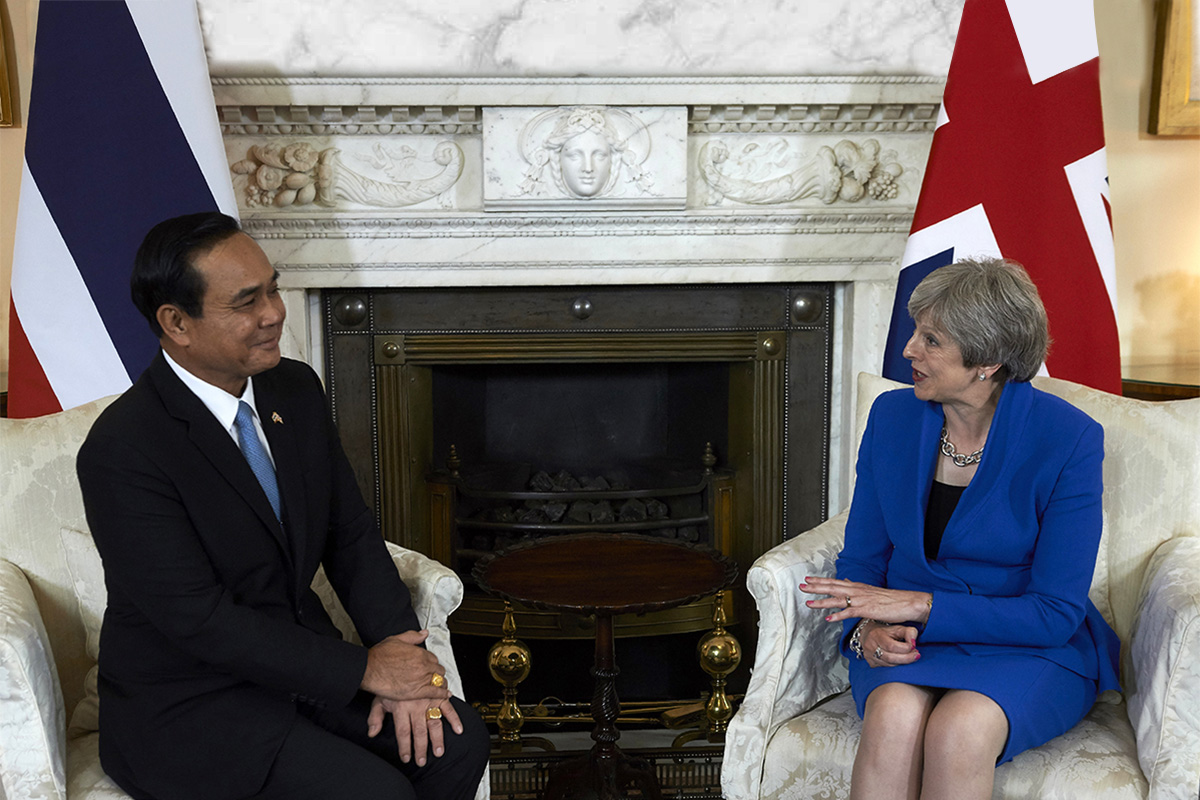Thailand’s Prime Minister Prayuth Chan-o-cha said his military government is committed to holding an election early next year, and that he may clarify his political future in September.
The pending coronation of King Maha Vajiralongkorn won’t affect the plan for a poll possibly in February, Prayuth said in an interview. He added that it was too early to make a decision on joining a political party ahead of the vote.
Prayuth, a former army chief, seized power in Thailand in May 2014 after a prolonged period of sometimes bloody unrest, pledging to restore stability and revamp the country’s political system. Over the years the timeline for elections has been repeatedly pushed back, most recently to February 2019. Earlier this week, Prayuth said the coronation of the king would precede the polls, stirring fresh doubt about the latest schedule.
“I don’t think there will be any issue with the coronation and the general elections,” Prayuth, 64, said in London Thursday on an official visit. “It shouldn’t have an impact on the roadmap. I think we can work on both in tandem.”
The current stretch of military rule is one of the longest since the 1970s, in a nation with frequent coups since the end of absolute monarchy in 1932. Prayuth has unfettered executive power as head of the National Council for Peace and Order, the formal name of the junta, and politicians have speculated he may seek to retain power after the election.
“Some people are worried that what I’m working on now will not be transferred to future governments, that there will be no continuity to my policy,” he said.
Staying on?
The next vote will be under a military-backed constitution, which critics say gives appointed soldiers, judges and bureaucrats the power to stifle elected politicians. The charter makes it possible for Prayuth to be reappointed as premier in certain circumstances – even if he doesn’t join a political party.
It’s also not clear whether a fresh election will inspire confidence in Thailand’s outlook, or revive memories of its destabilizing cycle of violent protests and military intervention to oust elected governments. While economic growth is at a five-year high, the military government faces a fight for support as people in rural areas say they aren’t seeing the benefits of the expansion.
In the years before the most recent army takeover, fissures in Thai society triggered violent clashes between urban royalists and rural backers of exiled former leader Thaksin Shinawatra. Allies of Thaksin have won every election dating back to 2001, only to be unseated by the courts or military.
Thaksin’s sister Yingluck Shinawatra, whose government was ousted in the 2014 coup, fled the country last year to avoid a jail sentence in a negligence case she said was politically motivated. The United Kingdom (UK) has since given her a 10-year visa, according to a report by BBC Thai.
Cycle of unrest
The economy slowed to a crawl in the months of protests leading up to the coup more than four years ago. The junta banned political activity after seizing power and continues to impose the prohibition, although it has permitted parties to make some initial preparations for elections.
Growth in Southeast Asia’s second-largest economy has recovered and jumped to 4.8 percent in the first quarter. Prayuth’s administration has tried to diversify the economy, seeking to curb reliance on tourism and exports of products such as parts for computers and cars. It’s accelerated large transport projects, cut red tape and put more money in the pockets of low-income households.
The government is also touting the Eastern Economic Corridor (EEC), a US$46 billion development project on the eastern seaboard to promote urbanization and encourage the development of advanced industries.
One unanswered question is whether the next civilian administration will champion the same policies or try to dismantle them. Political risk is one of the challenges to reviving private-sector investment, which was subdued after the unrest and coup until a recent uptick.
The EEC is backed by legislation and is part of Thailand’s long-term strategy, so the next administration will continue it, Prayuth said.
Rights abuses
The European Union (EU) and United Nations (UN) have accused the junta of severely curtailing civil rights and freedom of expression. The military administration in a January letter to the UN said it supports and values freedom of expression within the law.
But in December, the EU said it would pursue a gradual political re-engagement with Thailand because of the prospect of an end to military rule.
Prayuth visited British Prime Minister Theresa May on Wednesday and meets French President Emmanuel Macron on Monday. He and Macron are expected to preside over the signing of an agreement for Thailand to purchase a satellite from Airbus SE.
Prayuth said the political system implemented by his government is intended to stop the cycle of unrest and coups.
“We don’t want to see intervention in the future,” he said. “The system that we designed and put in place now is to make sure that Thailand will become a fully functional democratic country.” – Bloomberg
